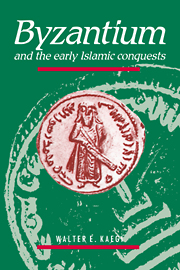Book contents
- Front Matter
- CONTENTS
- List of illustrations
- Preface
- List of abbreviations
- Chapter 1 The problem of Byzantium and the early Islamic conquests
- Chapter 2 The Byzantine Empire in an era of accelerating change
- Chapter 3 Difficulties in devising defenses for Syria
- Chapter 4 The first Muslim penetrations of Byzantine territory
- Chapter 5 Early tests in southern Palestine
- Chapter 6 Problems of cohesion: the battle of Jābiya- Yarmūk reconsidered
- Chapter 7 The brief struggle to save northern Syria and Byzantine Mesopotamia
- Chapter 8 Byzantium, Armenia, Armenians, and early Islamic conquests
- Chapter 9 Controversy and confidence in the seventh-century crisis
- Appendix 1 Author and date of the anti-jewish treatise
- Chapter 10 Elements of failure and endurance
- Bibliography
- Index
Chapter 1 - The problem of Byzantium and the early Islamic conquests
Published online by Cambridge University Press: 22 September 2009
- Front Matter
- CONTENTS
- List of illustrations
- Preface
- List of abbreviations
- Chapter 1 The problem of Byzantium and the early Islamic conquests
- Chapter 2 The Byzantine Empire in an era of accelerating change
- Chapter 3 Difficulties in devising defenses for Syria
- Chapter 4 The first Muslim penetrations of Byzantine territory
- Chapter 5 Early tests in southern Palestine
- Chapter 6 Problems of cohesion: the battle of Jābiya- Yarmūk reconsidered
- Chapter 7 The brief struggle to save northern Syria and Byzantine Mesopotamia
- Chapter 8 Byzantium, Armenia, Armenians, and early Islamic conquests
- Chapter 9 Controversy and confidence in the seventh-century crisis
- Appendix 1 Author and date of the anti-jewish treatise
- Chapter 10 Elements of failure and endurance
- Bibliography
- Index
Summary
CHALLENGES IN THE SOURCES AND METHODOLOGY: INTRODUCTORY REMARKS
The Roman emperors and Augusti were always of the same opinion, which I am telling you, not only those who stayed in Rome, but also those who stayed in Byzantium [Constantinople], including Constantine the Great, Julian, Jovian, and Theodosius. Sometimes they stayed in the east, and sometimes in the west, but they stayed in Byzantium [Constantinople] very little. At that time all the provinces were tranquil including all of Europe and Africa, and the best part of Asia as far as Euphratesia, and the lands of Adiabene, Armenia, Syria, Phoenicia, Palestine, and Egypt, and even the great and much-prized Babylon were subject to the Romans. But from the time great torpor fell on men, rather like an epidemic, nothing good has happened to the Roman Empire.
Such was a late eleventh-century Byzantine retrospective diagnosis of the causes for the loss of so many former territories of the Roman Empire. The author, Kekaumenos, simply attributed the downfall of the empire to the proclivity of emperors to avoid leaving the capital for the provinces. This is an inquiry into only a part of the same phenomenon that vexed Kekaumenos: the character and causes of the Byzantine loss of Palestine, Syria, and Byzantine Mesopotamia to the Muslims in the 630s and 640s and the immediate consequences of these developments for the Byzantine Empire, especially Anatolia, for its armies, and for its worldview.
- Type
- Chapter
- Information
- Byzantium and the Early Islamic Conquests , pp. 1 - 25Publisher: Cambridge University PressPrint publication year: 1992



